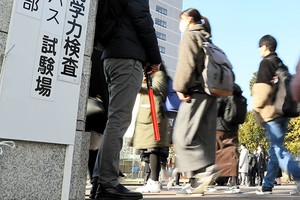THE ASAHI SHIMBUN
July 28, 2022 at 19:01 JST
 A Toshiba Corp. shareholder enters a venue of the company’s shareholders’ meeting in Tokyo on June 28. (Kenji Izawa)
A Toshiba Corp. shareholder enters a venue of the company’s shareholders’ meeting in Tokyo on June 28. (Kenji Izawa)
A record 663 directors were paid more than 100 million yen ($740,000) in remuneration at listed companies, according to recently compiled data.
Tokyo Shoko Research Ltd. collected the statistics of 2,355 listed companies that disclosed information for fiscal 2021.
The 663 reported was 119 more than the record number reported in the previous fiscal year.
In addition, 663 is more than double the figure for fiscal 2009, which was 289.
Companies have been required to disclose the remuneration for directors that exceeded 100 million yen since fiscal 2009.
This year, good performances of export companies and stock price-linked remunerations boosted the number of the “100-million-yen players” among company directors.
Tokyo Shoko Research calculated the pay gap between a director’s remuneration (excluding those linked to stocks) and the average salary of employees within the same company.
The largest pay gap was observed at Toyota Motor Corp.
The remuneration paid to director James Kuffner was 906 million yen, 105.7 times the average salary of the company’s employees, which was 8.57 million yen.
The simple comparison between the average remuneration of all directors earning more than 100 million yen and the average employees’ salary shows that the former was 25.1 times larger than the latter.
While the number of highly paid directors was increasing, salaries of regular employees didn’t increase much, Tokyo Shoko Research found.
A record 287 companies had a director or directors whose remuneration was more than 100 million yen.
This was 34 more than the previous fiscal year.
Hitachi Ltd. had the largest number of such directors for the third consecutive year.
In the latest statistics, the company was shown to be paying 18 directors more than 100 million yen, three more than the previous fiscal year.
At Toshiba Corp., 13 directors were paid more than 100 million yen, significantly more than just the one director in the previous fiscal year.
Among 14 companies ranking in the top 10 firms with the largest number of directors earning at least 100 million yen, the number of such directors increased from the previous fiscal year at 10 of them.
Directors’ remuneration consists of a fixed salary as well as bonuses and stock-based remuneration.
Japanese companies are increasingly introducing arrangements in which directors’ remuneration includes that linked to share prices or performance.
Shin Jungho, director of Z Holdings Corp., was the highest-paid director among the 2,355 companies, with 4.335 billion yen.
He was paid 4.1 billion yen of this in stock options, the right to purchase stocks of a company the individual works for at an agreed price in the future.
Z Holdings owns companies including Yahoo! Japan Corp. It was merged with Line Corp. in March 2021.
Jungho played a leading role in developing the Line communication app.
Some directors were paid huge retirement payments or special contribution bonuses on top of their remuneration when they retired.
They include Hajime Kurotsuchi, founder of Daiichi Kotsu Sangyo Co., who was the second-highest paid director, the data shows.
They also include Osamu Suzuki, former chairman of Suzuki Motor Corp., and Shigetaka Komori, former chief adviser at Fujifilm Holdings Corp., who were the sixth- and eighth-highest paid directors, respectively.
UNHAPPINESS WITH DIRECTORS’ HIGH PAY
Shareholders have voiced criticism about the massive payouts to directors.
“Even if the company’s performance is improving and its market value is rising, its management is in crisis. Shouldn’t the company change its rules about directors’ remuneration?” one investor asked at Toshiba’s shareholders’ meeting on June 28.
Among the company’s 13 directors who were paid more than 100 million yen was Satoshi Tsunakawa, who resigned as the company’s president in March.
He was paid 523 million yen. Toshiba's current president, Taro Shimada, was paid 191 million yen.
The company announced its plan to split into three companies last fall, before modifying it to divide into two companies this year.
However, the modified plan was voted down at an extraordinary shareholders’ meeting in March, showing that the management crisis was still ongoing.
The company is currently considering management reconstruction plans including going private.
Its share price is rising amid speculation that an investment fund might purchase the company.
Takamasa Mihara, the company’s executive officer and senior managing director, replied to the shareholder’s question saying, “Our directors’ remunerations are determined by the remuneration committee. We will continue discussions (on directors’ remuneration).”
Hitachi and Nissan Motor Corp. are paying a larger portion of their directors’ compensation in performance-linked remuneration.
At Iida Group Holdings Co., a major housing company, increasing profits led it to pay more than 100 million yen to seven directors, many more than just the one who earned at least that amount in the previous fiscal year.
Z Holdings submitted a proposal at its shareholders’ meeting in June to revise its compensation guidelines.
It proposed to more than triple the cap on the total remuneration paid to its six directors, including those paid in cash and stocks, from 1.4 billion yen to more than 4.9 billion yen.
Yoshio Usumi, the company’s outside director, said about the proposal, “We decided on this after recognizing the global situation.”
The company intends to raise the ratio of stock-based compensation in directors’ remuneration to 60 to 80 percent.
Shareholders raised a concern at the meeting by asking, “Is it right to raise the cap of directors’ remuneration when the company’s share price is falling?” and “Can we expect the directors to contribute to the company only when it pays them such remuneration?”
However, the proposal was approved by the majority of the shareholders present.
(This article was written by Tomonori Washida, Koichi Murakami and Yasuyuki Onaya.)




















A peek through the music industry’s curtain at the producers who harnessed social media to help their idols go global.
A series based on diplomatic documents declassified by Japan’s Foreign Ministry
Here is a collection of first-hand accounts by “hibakusha” atomic bomb survivors.
Cooking experts, chefs and others involved in the field of food introduce their special recipes intertwined with their paths in life.
A series about Japanese-Americans and their memories of World War II